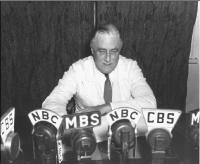
On December 7, 1941, Japanese warplanes bombed the US naval fleet
stationed at Pearl Harbor. The surprise attack wiped out most the
American Navy in the Pacific and left 2,403 Americans dead. It occurred
while a delegation from Japan was negotiating terms of American neutrality.
Perhaps the most amazing thing about this speech, was that Roosevelt composed
the entire address in just a few short hours. Roosevelt learned of
the attack that morning. After a full day of gathering information
from Hawaii and meeting with military leaders, the President locked himself
in the Oval Office. Four hours later, he asked for his personal secretary--Grace
Tully.
After walking into his office, Tully describes what happened next:
"Sit down Grace," the President instructed. "I am going before Congress
tomorrow. I'd like to dictate my message. It will be short."
According to Tully, the President began in the same calm tone in which
he dictated all his messages. His dictation was the only thing different.
He spoke each sentence slowly, specifying where to put each punctuation
mark and each paragraph.
"Yesterday comma December seventh comma 1941 dash a day which will live in infamy dash the United States of America was suddenly and deliberately attacked by naval and air forces of the Empire of Japan period new paragraph....
Live radio coverage of congressional processings began around 10 a.m.
in anticipation of Roosevelt's noon-time address.
Just 23 hours after the attack, the President, beginning with words
that harken back to Lincoln's Gettysburg Address, spoke to a joint session
of Congress.
By recounting the attack on Pearl Harbor, Roosevelt unified the nation.
His long list of Japanese aggression created a rhythm designed to raise
national ire. This was supported by the speech's cadence, which was
built on short sentences and anaphora--the repetition of first words within
successive phrases. By using successive short sentences.
Roosevelt's delivery also added to the impact of the address.
The President paused dramatically between phrases, creating the impression
of resolve and deliberate forward motion. The President raised his
head and swept it around in a circle when he stated "our people, our territory,
and our interest." In doing so, Roosevelt symbolically included all of
Congress and the nation.
When he was finsihed, Congress erupted in thunderous applause.
That afternoon, Congress passed Roosevelt's resolution by a nearly
unanimous vote of 88 to 0 in the Senate and 388 to 1 in the House.
The handful of Congressmen who were out of town that day rushed explanations
and pledges of support into The Congressional Record.
After the adress, Roosevelt's wartime measures received unparalleled
support. Even vocal opponents of the President suspended criticism.
Ultra-conservative Congressman Clare Hoffman of Michigan, in a rare moment
of support, was quoted saying, "Out of the sky came a vicious assault...
and ere [the] representative of the Democratic Party...became our President."
Text
and photos © Pieri & Spring Productions. All rights reserved.
All sounds & images contained or linked from this site retain their original copyright as owned by their respective audio recording or movie production companies. All files are for entertainment, educational and research purposes only.